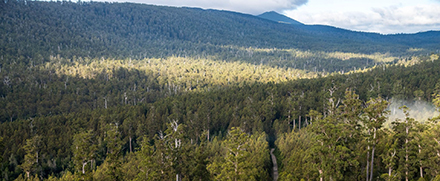The misuse of the term native forestry has the potential to unfairly tarnish Tasmania’s sustainable forestry industry, writes Nick Steel.
One of the constants in Tasmanian political discourse is the argument around Tasmania’s “native forestry”. It’s a catch-all term loved by the opponents of our industry and is cleverly used to muddy the waters of what we do.
Our detractors like to talk about native forestry and old growth forests in parallel, to confuse what native forestry is but that misinformation benefits no one.
Vast swaths of forestry in Tasmania comes from hardwood plantations, often held in private estate, yet still subject to some of the world’s most stringent environmental protections.
Our naysayers will incorrectly claim this estate, carefully planted and grown as a production crop, is native forestry because of the use of eucalyptus trees. But these are clearly plantations, managed for a range of wood products and environmental benefits.
Then there’s our sustainable managed regrowth forests. These are on land specifically earmarked for production forestry, regularly harvested and regenerated again – using seeds harvested from the same forestry coupes to ensure biodiversity.
If a managed regrowth forest is left in the ground for longer, this becomes mature forest. It’s not old growth as our detractors would have you believe, but rather production forests which have been left for longer periods.
Finally, Tasmania does harvest a small quantity of old growth forests, in land set aside for productions forests and used mostly for special species timber – crucial in traditional industries such as boatbuilding and furniture making. It’s a tiny part of what we do, but it’s an important part of Tasmanian culture.
Production forestry makes up only a small fragment of our state, with over two thirds of the state’s forests permanently protected in parks and reserves – and much of the remaining on private property. The small part we harvest each year supports thousands of jobs, scores of regional communities, and helps keep the Tasmanian economy moving.
Nick Steel is Chief Executive Officer of the Tasmanian Forest Products Association






